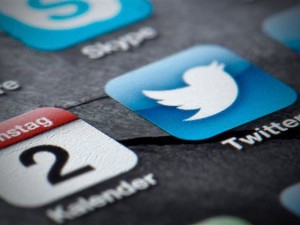NEW YORK – People don’t just watch TV anymore; they talk about it on Twitter. From the comfort of couches, they share reactions to touchdowns and nail-biting season finales —and advertisers and networks are taking note.
Examples of Twitter’s influence abound. The recent finale of “Breaking Bad” generated a record 1.24 million tweets. The conversation peaked at 22,373 tweets per minute according to analytics firm SocialGuide. People used the hashtag “GoodbyeBreakingBad” nearly 500,000 times. During this year’s Super Bowl, sports fans generated 24 million tweets about the competition and nearly half of the game’s nationally televised commercials contained hashtags that encouraged viewers to tweet.
Twitter, says Debra Aho Williamson, an analyst at research firm eMarketer, “creates a community, a bond between people that doesn’t really exist without Twitter.”
As Twitter prepares for its initial public offering, the San Francisco-based company is also working hard to insert itself into the TV advertising economy. In recent months, the social networking company has forged partnerships with television content owners such as CBS, MTV and the NFL through a program it calls Amplify. The platform lets content owners beam real-time video clips to Twitter users who may have seen —or could be interested in— their TV programming. It also allows marketers to communicate with viewers who saw their TV ads, extending commercial pitches to consumers’ smartphones and tablets.
TV tie-ins allow Twitter to diversify its revenue stream beyond the relatively small niche of digital advertising campaigns, a move that should appeal to potential investors. On Thursday, Twitter unsealed documents for a Wall Street debut that could take place before Thanksgiving. While the company did not reveal how much money it makes from its TV partnerships, it touted its own “strength as a second screen for television programming.”
Twitter wrote in its S-1 filing with the Securities and Exchange Commission that “45% of television ads shown during the Super Bowl used a hashtag to invite viewers to engage in conversation about those television ads on Twitter.”
Twitter’s public nature makes it an especially attractive platform for tracking live-TV conversations. So much so that Nielsen recently began using Twitter’s data to measure online social activity around TV programming, starting with this fall’s TV season.
Nielsen will release its first “Nielsen Twitter TV Ratings” report on Monday. The study measures TV-related conversations on the social network. Nielsen found that in the second quarter of this year, 19 million people wrote 263 million tweets about live TV events, up 38 percent from a year earlier.
Separately, Nielsen found that the “Breaking Bad” finale was by far the most tweeted-about program last week.
On Sunday, the NFL showed just how Twitter-enabled promotions work. Minutes after Cincinnati cornerback Adam Jones intercepted New England’s Tom Brady, ending the quarterback’s streak of 52 games with a touchdown pass, the NFL posted a video clip on Twitter. The clip shows Jones bobbling, and then snagging the ball before it hits the ground.
The 32-second clip was prefaced by an 8-second video ad for a Verizon Droid mobile phone. “Adam Jones ends the Pats undefeated season, Brady’s TD streak AND a rainstorm. With 1 INT,” the league tweeted.
By inserting itself into the online buzz, the NFL was able to remind people the game was going on live at its NFL Network channel. Meanwhile, it earned new revenue from Verizon, a longtime sponsor that wanted to showcase its NFL Mobile app.
The NFL has more than 5.1 million followers on Twitter. But its new partnership with Twitter means the tweet also went out to millions of other users who might be interested.
Hans Schroeder, the NFL’s senior vice president of media strategy and development, says he expects promoted tweets will eventually reach tens of millions of fans, multiplying its reach.
“We think it’ll drive tune-in to our games and drive more people into the experience through NFL Mobile,” Schroeder says.
As part of the deal, Twitter shares some of the revenue from Verizon’s advertising spend when the phone company pays for “promoted tweets.” Previously, the money might have gone only to the league itself.
Twitter’s projected 2013 revenue is about $582 million, according to research firm eMarketer. At the moment, the company generates tens of millions of dollars of revenue from all of its TV deals, including those with ESPN, Turner networks, CBS and others, according to Brian Wieser, an analyst with Pivotal Research Group.
That’s not huge. However, says Wieser: “This year, it’s about getting the foot in the door.”
Wedbush Securities analyst Michael Pachter estimates that Twitter gets just a small fraction of its revenue from the TV deals — around 1 percent. But by next year, the deals could amount to 5 percent, and 15 percent the year after, he says.
Twitter isn’t alone in its quest to befriend TV content companies. Facebook, too, is recognizing the value of live TV chatter. Because of its sheer size — nearly 1.2 billion users versus Twitter’s 218 million — Facebook has more conversations than any other social network. During the “Breaking Bad” finale, more than 3 million people generated 5.5 million “interactions,” that is, status updates, comments or “likes.”
For now, Facebook’s TV partnerships are not intended to generate revenue, the company says. Rather, they are “focused on helping people discover great content,” says Justin Osofsky, Facebook’s vice president of media partnerships.
Over the past few months, Facebook has rolled out more Twitter-like features as competition between the world’s leading social networks heats up. There are now hashtags on Facebook, and the company is encouraging celebrities to use its site to interact with fans —just as many of them do on Twitter.


